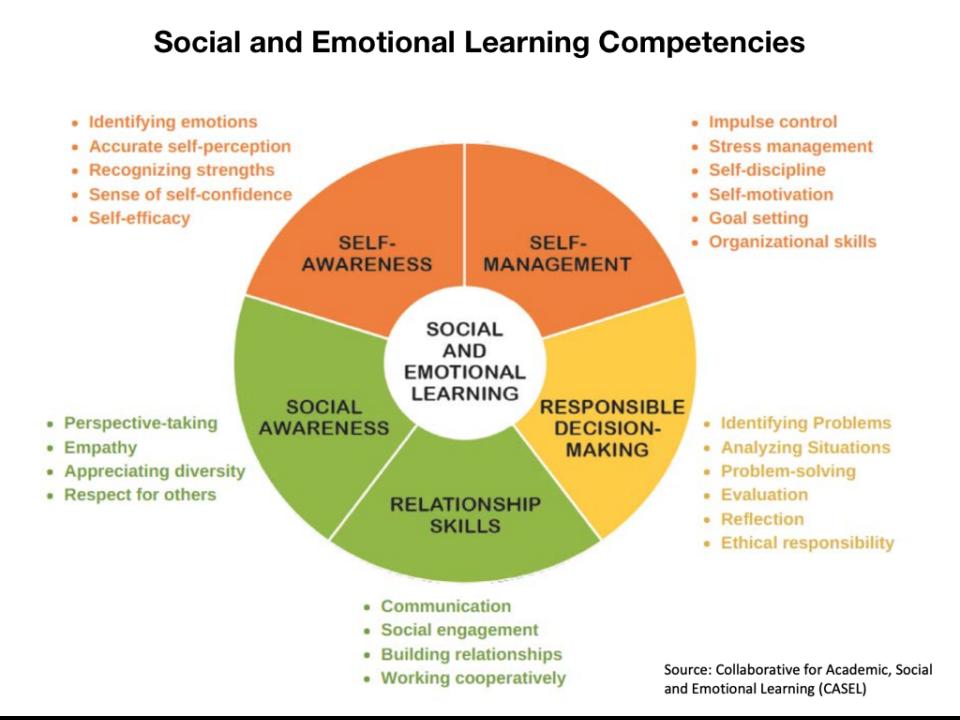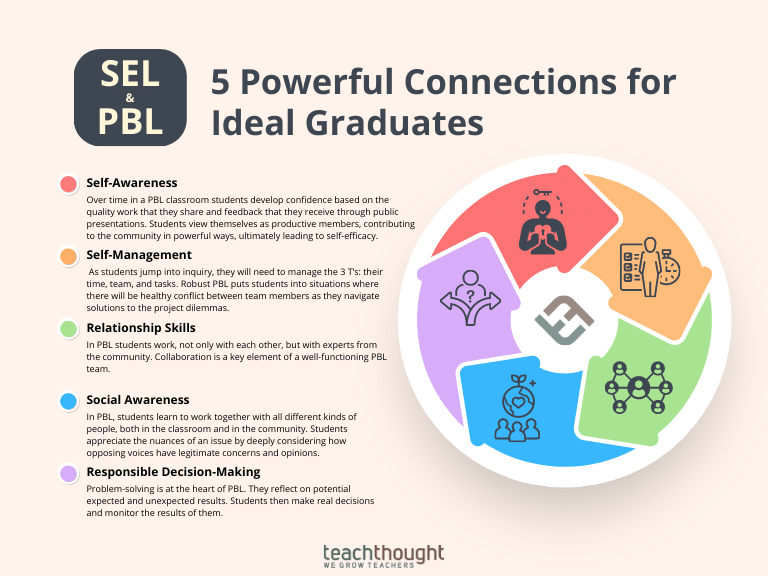contributed by Mike Kaechele
Educators individually answer the prompt, “What do you want your students to know and be able to do after their year with you?” Then the responses are collected and documented as a whole group.
I myself have done this protocol with thousands of educators across the country from pre-K to college. The results are always the same. Almost the entire list is outside of the curriculum at first glance. Once in a while, something like reading fluently makes the list, but content is mostly missing. Instead, what teachers suggest are skills.
See also What Is Project-Based Learning? A Definition
Many of the characteristics listed are ‘soft skills,’ a term that I have come to despise. What I have realized is that the characteristics of an ideal graduate are actually social and emotional competencies. After running this protocol with teachers, I now follow it up by showing the CASEL competencies and have them make connections between their ideal graduate goals and the five CASEL categories and their subheadings.

This naturally leads to the question: if these SEL skills are high-priority goals as a school and they mostly fall outside of our content standards, then how do we teach, practice, and assess SEL competencies?
The next question is when do we, as classroom teachers, have time to do this in our already overwhelmingly busy schedule? My answer, of course, is project-based learning. PBL is the perfect structure to teach, practice, and assess SEL skills and content standards simultaneously. Let’s consider a few of the ways that students can develop SEL skills while at the same time learning content through PBL.
Self-Awareness
A low-hanging fruit example is for students to explore their identity in a project centered on who they are or their role in the community. Adolescents love to explore and share who they are becoming. Identity work is an opportunity for students to discover the connections between seemingly different members of the classroom leading to cohesion and appreciation of diversity.
Over time in a PBL classroom, students develop confidence based on the quality of work that they share and the feedback that they receive through public presentations. Students view themselves as productive members, contributing to the community in powerful ways, ultimately leading to self-efficacy.
See also What Are The Different Types Of Project-Based Learning?
Self-Management
As students jump into inquiry, they will need to manage the 3 T’s: their time, team, and tasks. Robust PBL puts students into situations where there will be a healthy conflict between team members as they navigate solutions to the project’s dilemmas.
This is an excellent opportunity to provide students with scaffolding and tools to manage deadlines, disagreements, and expectations from community partners. PBL teachers use the Need to Know process, group contracts, scrum boards, and other structures to teach students to address their own challenges rather than organizing everything for them.
Relationship Skills
Two of the most important skills that students need today are collaboration and communication. In PBL, students work not only with each other but often with experts from the community. They learn how to give and receive productive feedback to each other. Students present their findings in both written and spoken forms. Communication skills are practiced daily.
Additionally, students learn how to navigate personality challenges and differences of opinion in productive ways. Team members must divide up the work and then share their findings with each other to complete their project tasks. Collaboration is a key element of a well-functioning PBL team.
See also Examples Of Student Work In Project-Based Learning
Social Awareness
In PBL, students learn to work together with all different kinds of people, both in the classroom and in the community. Building on the class culture, when developed through identity work, students appreciate that difference can lead to creativity and a valuing of shared humanity rather than divisiveness.
Another skill that can be developed in PBL is empathy. Students must investigate the project challenges from multiple perspectives. They may interview or take on the role of various views in the community. Students appreciate the nuances of an issue by deeply considering how opposing voices have legitimate concerns and opinions.
Responsible Decision-Making
Problem-solving is at the heart of PBL. Student teams engage in Rich Inquiry to understand the project challenge. They empathetically consider all viewpoints in their proposed solutions. They reflect on potential expected and unexpected results. Students then make real decisions and monitor the results of them.
Students find that they can have a voice in their community and make a difference right now. This leads them back to Self-Awareness as students see themselves as powerful change-makers, building the knowledge and skills to help address and fix needs in their community.
Ultimately cultivating SEL skills in students is a major part of the ‘final product’ of project-based learning.
Of course, students do not come to our classrooms with these SEL skills fully developed, but the PBL framework gives the opportunity for teachers to teach, practice, and assess the competencies naturally throughout the day. PBL protocols and tools enable this process to be smooth and ongoing.
What educators quickly realize is that the SEL competencies listed in the ideal graduate protocol are not separate from the learning curriculum. Instead, they are the requisite skills that empower students to collaborate together in the inquiry process.
So rather than finding time to add SEL lessons, PBL educators discover that teaching SEL competencies throughout the year saves time in classroom management and leads students to deeper learning of their content standards. Most importantly, it helps create the next generation of leaders in this world.
